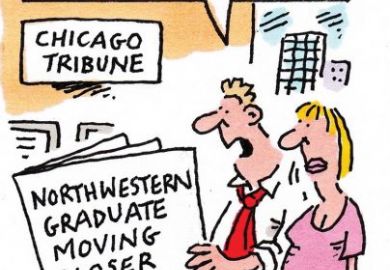
The seemingly unstoppable rise in the share of students leaving UK universities with a first-class degree has finally stalled. According to data released by the Higher Education Statistics Agency, 28 per cent of graduates achieved a first in 2018-19, the same proportion as the year before. That news, however, did not stop education secretary Gavin Williamson from lamenting how top grades remained at an “all-time high”, thereby enabling the customary round of “end grade inflation” stories that appear in mid-January. He later told journalists that he wanted universities to “reverse” grade inflation, which, given the intense political pressure on this issue for several years, is probably not that unlikely in the coming years.
University of Southampton students had some surprising news when they opened an email purporting to be from their vice-chancellor, informing them of his supposed recent phone call with Boris Johnson: “Unfortunately due to budget constraints and the pressure Brexit is placing on the economy the government has taken the decision to close six universities.” Issues of institutional autonomy aside, this was towards the more credible end of the spectrum as bogus emails go. Southampton would be “the first to close with immediate effect”, the bombshell message continued. As The Tab reported, it added that all students “will be rehoused at a far superior university. You will all be transferred to Solent University for the next semester.” The author – whom Southampton pledged to track down in order to administer “appropriate action” – not only showed a keen grasp of the poisonous status hierarchies within English higher education, but inadvertently satirised the profile and impact of the university’s senior management by claiming to be Sir Christopher Snowden. Sir Christopher stepped down as vice-chancellor in spring 2019 and was replaced by Mark Smith.
When auditors at Drexel University in Philadelphia looked into unreceipted expenses claims lodged by Chikaodinaka Nwankpa, then head of its electrical engineering department, they found that nearly half of his spending had been at weekends, “and most of it between midnight and 2am at venues including Club Risque and Cheerleaders”. These establishments, the auditors suspected, were not bona fide providers of electrical engineering research expertise. The matter has escalated somewhat, with Philadelphia prosecutors now accusing Professor Nwankpa of “spending $96,000 [£73,924] in federal grant funds at adult entertainment venues and sports bars between 2010 and 2017”, as well as having “squandered $89,000 – funding he had secured for science, energy, and naval research – on iTunes purchases and meals”, The Philadelphia Inquirer reported. Professor Nwankpa “admitted the unauthorised expenses when confronted by university officials”, resigned his post and offered to pay back around a third of the money, the newspaper said.
A BBC Question Time exchange between actor Laurence Fox and a university lecturer sent Twitter into meltdown after the Lewis star described her as “racist” for calling him a “white privileged male”. Rachel Boyle, senior lecturer in primary education at Edge Hill University, clashed with Mr Fox during a discussion about the media’s treatment of Meghan, Duchess of Sussex, claiming she had been driven out of the royal family by “racism”, The Times reported. When Mr Fox rejected the claim, calling it “boring”, Ms Boyle drew attention to the Harrow-educated actor’s background, which he, in turn, claimed was racist as his race was an “immutable characteristic”. Mr Fox later took to Twitter to say he had spoken “truth to nonsense” as online criticism over his comments raged. Ms Boyle told The Observer that she had been bombarded with hate messages via social media. “At this stage I’m not worried but I’m going to monitor it closely,” she said, adding she was “incredibly proud of how I handled the situation, of what I said”.
Euan Blair’s call for students to shun the UK’s “broken” university system for apprenticeships caused a few ripples given his prime minister father’s wish that half of young people enter higher education. The University of Bristol graduate told The Times that Labour’s landmark policy to expand access to higher education – which was finally achieved last year – had not worked as planned because, rather than creating opportunities, “most [leading] employers hire from a very small subset of universities”. Instead, students should consider applying to his start-up training company WhiteHat, “an outstanding alternative to university”, which fixes up school leavers with white-collar apprenticeships, he advised. He was then given the rest of the piece to wax lyrical about his firm’s achievements – with no space left for consideration of how the UK’s apprenticeships system, including its funding levy, might be significantly more broken than a tertiary sector serving 3 million students.
Register to continue
Why register?
- Registration is free and only takes a moment
- Once registered, you can read 3 articles a month
- Sign up for our newsletter
Subscribe
Or subscribe for unlimited access to:
- Unlimited access to news, views, insights & reviews
- Digital editions
- Digital access to THE’s university and college rankings analysis
Already registered or a current subscriber?




